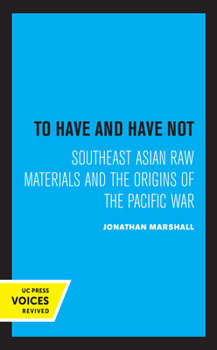To Have and Have Not: Southeast Asian Raw Materials and the Origins of the Pacific War
Select Format
Select Condition 
Book Overview
Jonathan Marshall makes a provocative statement: it was not ideological or national security considerations that led the United States into war with Japan in 1941. Instead, he argues, it was a struggle for access to Southeast Asia's vast storehouse of commodities--rubber, oil, and tin--that drew the United States into the conflict. Boldly departing from conventional wisdom, Marshall reexamines the political landscape of the time and recreates the...
Format:Paperback
Language:English
ISBN:0520304764
ISBN13:9780520304765
Release Date:September 2020
Publisher:University of California Press
Length:298 Pages
Weight:0.97 lbs.
Dimensions:0.7" x 6.0" x 9.0"
Customer Reviews
0 rating





